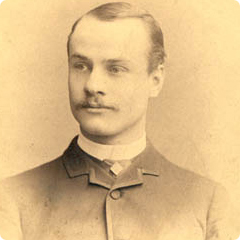 |
 |

|
 |

|
 |
"Optimism is essential to achievement and it is also the foundation of courage and true progress."
Nicholas Murray Butler (1862–1947)
Educator
Columbia College 1882, PhD 1884
Acting President 1901–02
President 1902–45
A giant of American higher education, Nicholas Murray Butler is one of the great figures in Columbia University's history—and, indeed, of American life in the first half of the twentieth century. Long active in the Republican Party, he was an intimate of several presidents and even received his party's electoral votes for vice president in 1912 following the death of the regular nominee. Butler went on to seek the Republican presidential nomination in both 1920 and 1928. He also served as president of the Carnegie Endowment for International Peace for 20 years, sharing the Nobel Peace Prize in 1931 for his commitment to international arbitration. The author of numerous books, reports, articles, and speeches, Butler received honorary degrees from leading universities around the globe and was decorated or otherwise honored by more than a dozen foreign nations. He completed a two-volume biography, Across the Busy Years, in 1940, and his death in 1947 occasioned a front-page story in the New York Times and tributes from many world leaders.
|
 |
 |
 |
 |
Columbia's president for 44 years—the longest tenure in University history—Butler raised 120 million dollars, doubled the size of the campus, and increased enrollment sevenfold, in part through the creation of several new graduate schools. His efforts propelled Columbia into the ranks of the world's leading institutions of higher learning and research: By the mid-1920s, about halfway through his tenure, the University's faculties of social sciences, biological sciences, humanities, and physical sciences were considered among the best anywhere. Butler himself served as president of the elite American Academy of Arts and Letters from 1928 to 1941.
Butler received his undergraduate, graduate, and doctoral degrees in philosophy from Columbia and joined the philosophy faculty as an assistant in 1885. In 1886 he became president of the Industrial Education Association, which he later transformed into Teachers College, and in 1890 was appointed a full professor of philosophy and education, as well as dean of the faculty. Upon succeeding Seth Low as Columbia's president, Butler immediately set out to make the school a leading national university, raising 15 million dollars in his first decade in office. Always an advocate of increased educational opportunities, Butler instituted the summer session and the University Extension—now the School of General Studies—and established the schools of journalism, business, library science, dentistry, and public health. It was under Butler that the College established the Core Curriculum, and he also oversaw the consolidation of Columbia-Presbyterian Medical Center, the first hospital and academic facility to combine teaching, research, and patient care.
Read more about Butler in the Columbia Encyclopedia.
|
 |
|
 |
 |
|
 |
|

